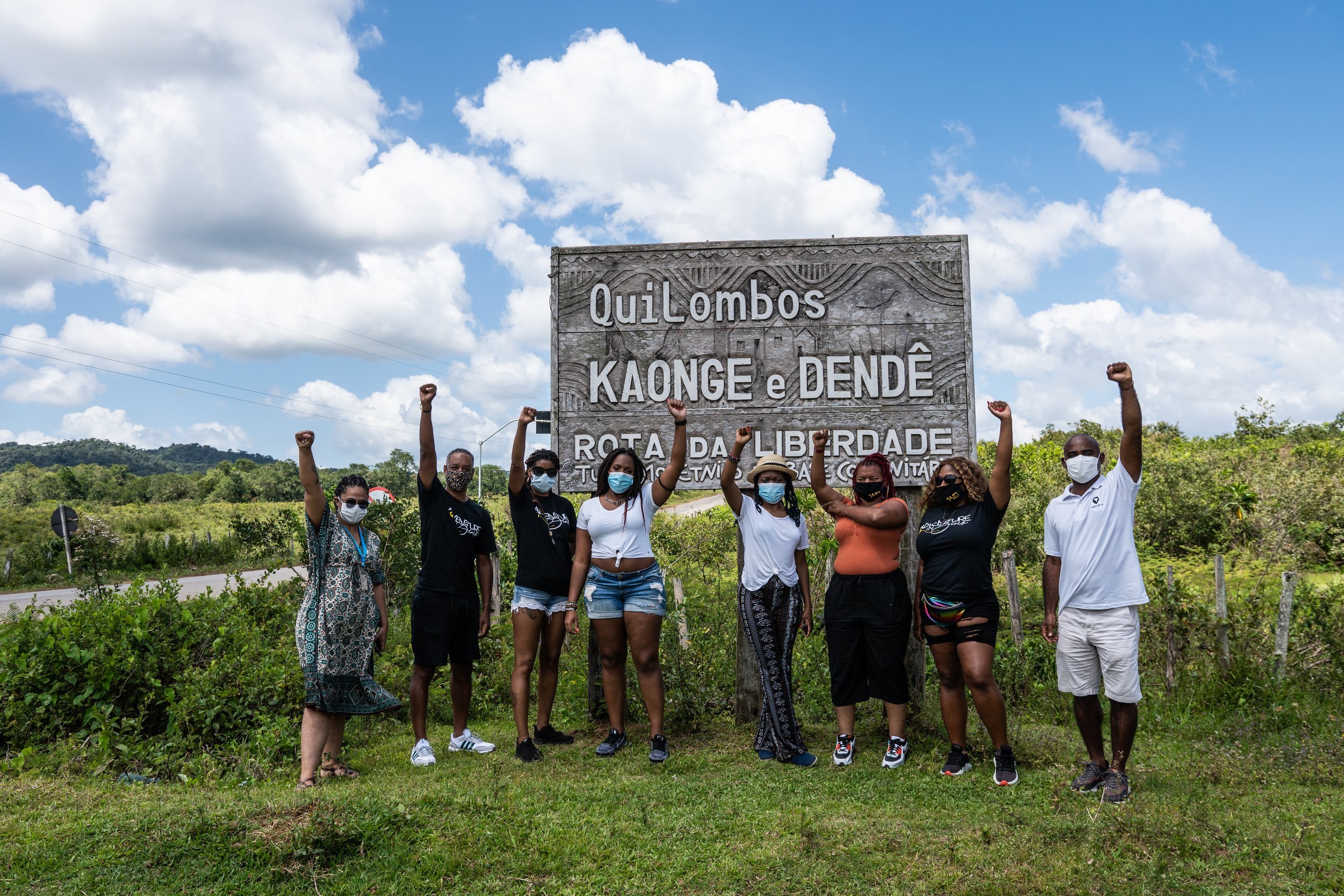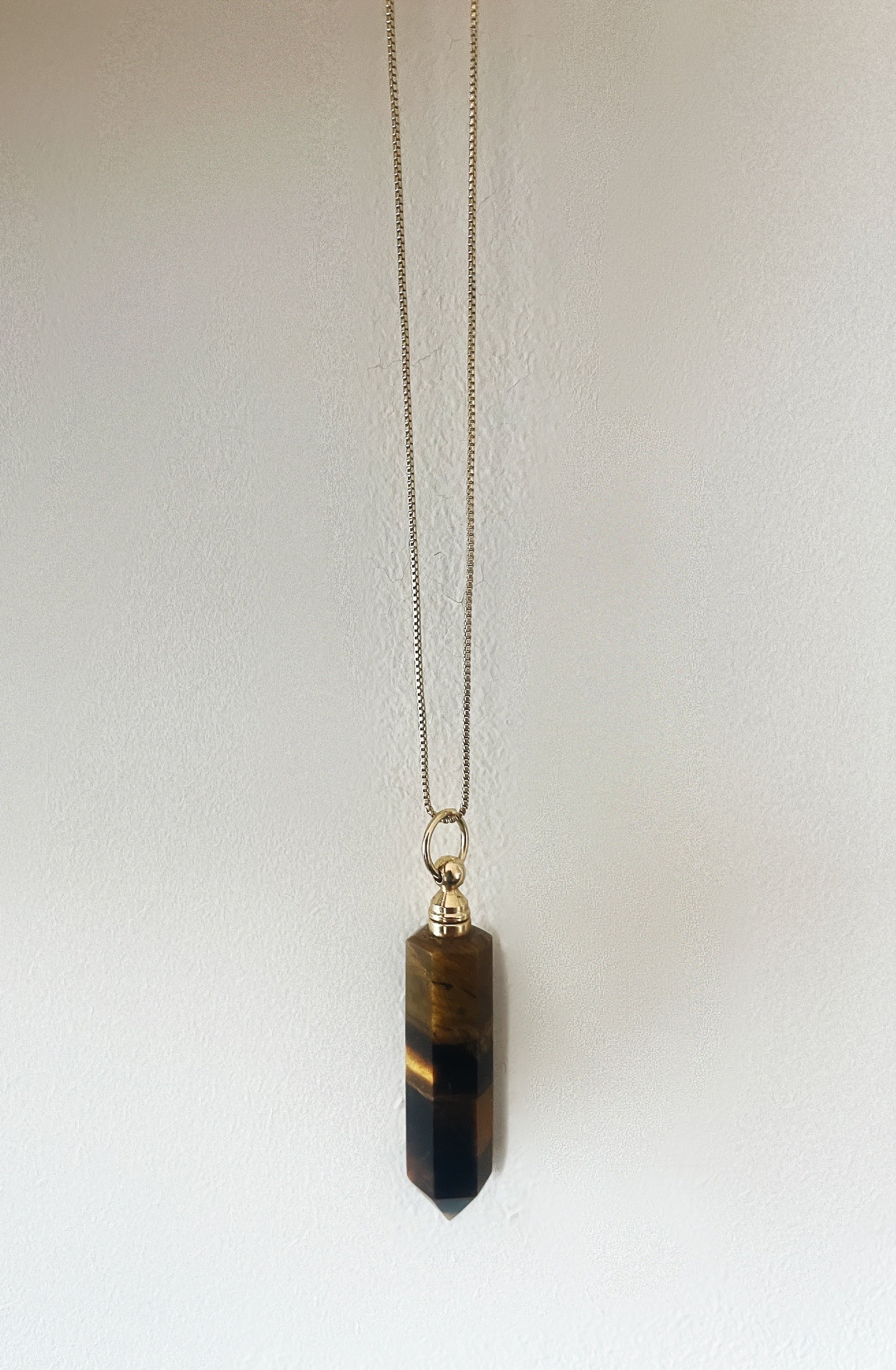Founder Stories: My Introduction to African Spirituality
The Adventure in Black travel family at the Carnival Experience. (You know we had to do it for The Gram.)
This past September, I had the unbelievable joy of hosting Adventure in Black’s tour of Brazil 2021. Let me tell you, I was super excited to be out in the world with an amazing group of first-time international travelers and some who’ve had their passports stamped quite a few times. This was my first time in Brazil. It was definitely one of the many, many places I’ve always had on my list of top black travel escapes, but I never had the chance to visit. There were many takeaways from this once-in-a-lifetime trip beyond the stuff I stocked up on at the markets. I fell in love with the lovely people, the flavors and the beaches, especially our afternoon spent on Grumari Beach catching all the good waves and sunshine!
Our phenomenal visit to the Quilombo Kaonge in. A must visit place in black travel.
Going to Quilombola Kaonge to break bread with a community of people with family ties linking back to the descendants of slaves who escaped captivity in Bahia in the 1600s was a major highlight for me. Being able to see how their way of life was preserved even years later was phenomenal. Ya girl was enjoying all parts of this insightful trip that brought great people together in a land that continues to stay with me even as I write this piece from my apartment here in Washington, D.C. (*sighs*) These instances are the benefits of black travel that I want to share with other people of color from all over!
My own tiger stone from Brazil that has been giving me good vibes since wearing it.
I returned to Rio de Janeiro after I watched Adventure in Black’s travelers depart from Salvador to spend a few days with Isabella--our wonderful travel partner in Brazil. Having the chance to bond with her and her awesome family off-the-clock gave me the chance to completely relax and also learn. Both Eddie, our tour guide for the Rio de Janeiro half of the trip, and Bongo, Isabella’s husband, were each wearing these beautiful amber-colored necklaces that were full of crystals. I could not take my eyes off it as it mirrored the sunlight that seemed to be coming from all directions during the group’s time in Rio de Janeiro. I finally asked Isabella’s husband during my visit one night at dinner, with her translating my English into his Brazilian Portuguese, the name of the necklace because you know my stone-loving self definitely wanted one. ‘Tiger stone’ was the answer, but the meaning behind it proved to be more important than the fashionable aesthetics of the piece and started another conversation I needed to have.
Eddie joined in about the elegant piece and told me that the item was a representation of Shango (or Xango)--his ‘orisha’ (or Orixá)--a deity in Yoruba--the religious foundation of the Candomble. I had only heard that religion mainly exists in Brazil, but was then informed that it was created in the ‘senzalas’, or ‘slave quarters’, where Africans of different ethnicities worshiped their respective gods and goddesses in rituals. The arc across language and custom was created when they soon realized that these deities had many similarities along with their unique characteristics. Its ties to Yorubaland of southwestern Nigeria still reach the ethnic groups practicing in different parts of the territory. These practices were in place long before the atrocities of The Middle Passage, but I never had the chance to speak to someone who was living it in truth. Eddie told me about the ‘inner strength' Shango gave him and how he didn’t know who he was as an individual until after embracing the powers of his deity.
Anyone who knows me will tell you that I’ve always been a sponge when it comes to learning about the many religions of the world. I love seeing fellowship. I grew up in a faily traditional black household that never missed any of the Sunday sermons I heard between the Episcopal and Baptist churches we attended, but my own curiosity drove me to hear mass in a Catholic church, chants in a Buddhist temple, east-facing prayers towards Mecca in a mosque and worship in a synagogue during my teens and later as an adult. Surprisingly though, conversations about the pre-colonial, polytheistic religions of Africa never happened around me. Learning about what Sirius means to the Dogon in Mali or how the Asante of Ghana pour libations as petitions of thanks to their creator Nyame was viewed as taboo and rarely spoken about in most of my circles while I was growing up. It amazes me that many people never get the chance to see another religion without the misconceptions of someone else guiding their judgment. Some people even thought, and still think, that doing any kind of research on these religions was a sign of interest to leave their own for a new one when they were just trying to better understand a different faith. I only had people’s poorly informed impressions of the African-based, Haitian-created Voodoo (or Vudom which is practiced throughout Africa with large populations of worshipers in Ghana, Togo, Benin and strong ancestral deities that are worshiped in Haiti, the Dominican Republic and Puerto Rico, also Santeria of Cuba and Tambor de Mina of Brazil) was fueled by the hearsay to spark the curiosity I stated earlier. The perfect equation for independent research, you could say. But therein Brazil, knowledgeable conversations about African Spirituality like the one I was having at dinner that night were being had all over the country by those who avidly and openly practice these customs with no pause. I felt like I was just entering a conversation that linked generations of people that was happening all my life. Definitely a realization that had me sitting back in awe.
Practitionors of Yoruba, donning tradition white face paint, in mid-ceremony at their place of worship in Nigeria. (Photo Credit: Wikipedia)
Bongo then brought it all together by showing the spiritual ties of the many colors of black people in Brazil and other places throughout the world. I began to see how these practices are alive in Brazil and show how much of ‘new age spirituality’ derives from the tenets of African Spirituality that lead back to everything Bongo was talking about in full detail as I sat tableside listening. His words made me think back to what Isabella did before I entered her home that evening. She used a small bundle of fresh herbs and started charting out my path in life using this plant. I asked why and she said that everything they did, they gave thanks to their orishas and were grateful for the lessons in life. Yes. This was very new to me, but dispelling myths by the research of living life through first-hand experiences is a part of the journey black travel offers us. You have to remember, life is the perspective of human beings through their own lens. Getting out of the judgmental comfort zones many of us have relied upon is the first step to living a freer existence. To Isabella’s point, I read an article once where it said people who start their days with gratitude live longer lives and gain more success. I honestly give thanks and praise for what the universe has granted me to do and see. This method with fresh herbs was just an extension of that practice through a different form that was a new way to show that same feeling. It was great to see the common graciousness we each shared for the many often overlooked details of our everyday lives.
Bongo mentioned how we (isabella and I) were spiritually linked due to our love of travel. (I can’t even tell you how spot-on this man was.) Soon after that he asked about my birthday and determined that Eshu was my orisha. I was told that he is often stereotyped as ‘the trickster’ at first, but I soon found out that the title was limiting once I saw how many layers there are to him. He is the messenger between Orun (the spiritual plane) and Aye (the physical plane) and translator of prayers to deities and giver of divine orders to humans. Eshu does it all. I was informed also that he ‘sets things in motion’ and ensures harmony with his maintaining of harmony through total balance. When I learned more, I found out that he’s actually the figure at the crossroads in believers’ lives. He creates an influx in your life so you can do what needs to get done so you can reach your goals on the road to finding complete balance with your personal mission or greater purpose of your destiny which you’re constantly evolving towards in existence on your spiritual plane. Before leaving, I found my own tiger stone to wear so I can tap into this energy I found on this trip to Brazil. Wearing it now reminds me, even more, to be grateful and to be more decisive than ever. African Spirituality is a large idea that I’m actively studying to learn more about and one I feel all of us--definitely those in the black travel space--should be speaking about more often. Whether you're a believer or atheist, all black people can appreciate the fact that the beliefs and customs at the center of African Spirituality in Brazil and elsewhere remained intact under the whiplike indoctrination of colonists hundreds of years ago to still enliven human beings like Eddie, Isabella and her family centuries later. It lets me know that there are so many more perspectives that even an active traveler like myself still has yet to see first hand--and that’s such a lovely thing to know.
Do you have an insightful memory from a trip you would like to share? Tell us about it below and be sure to follow us for more travels at adventureinblack.com




